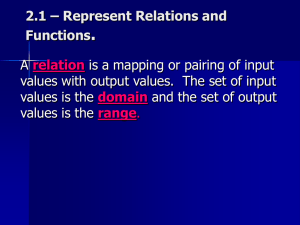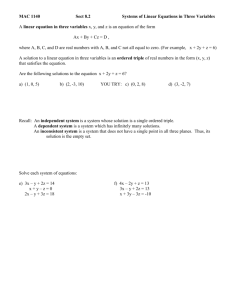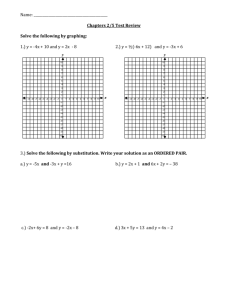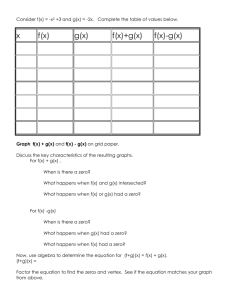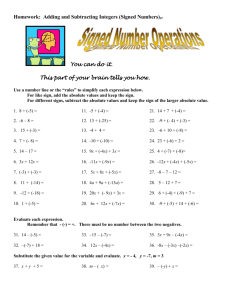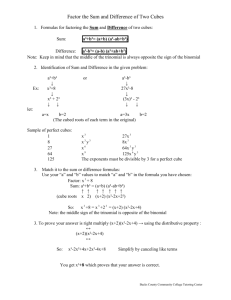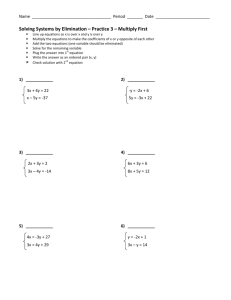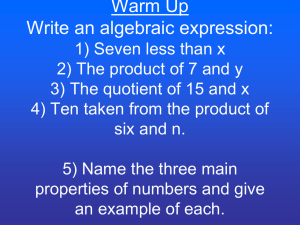PowerPoint 8.3 Elimination
advertisement
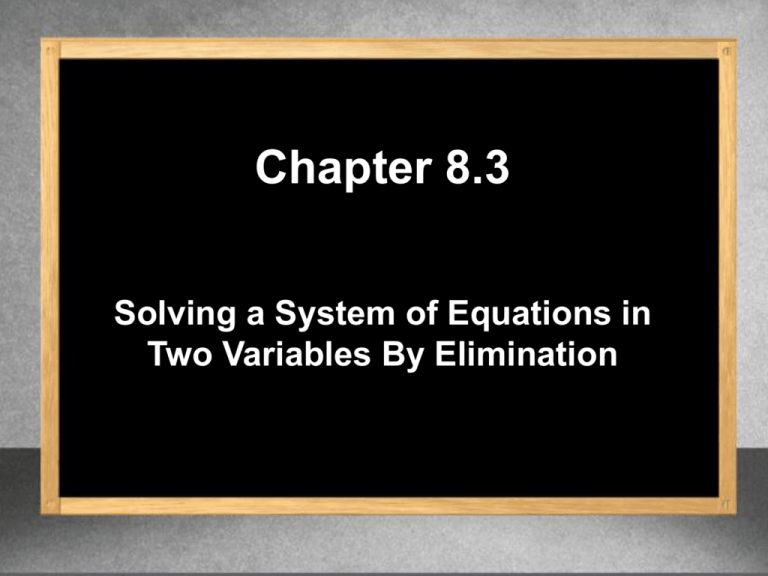
Chapter 8.3 Solving a System of Equations in Two Variables By Elimination Steps to solve a system of equations using the elimination method 1. The coefficients of one variable must be opposite. 2. You may have to multiply one or both equations by an integer so that step 1 occurs . 3. Add the equations so that a variable is eliminated. 4. Solve for the remaining variable. 5. Substitute the value into one of the original equations to solve for the other variable. 6. Check the solution. 1. Solve by addition. 3x + y = 7 5x – 2y = 8 step 1 coefficients of one variable must be opposite. 1. Solve by addition. 2( 3x + y = 7 ) 5x – 2y = 8 6x + 2y = 14 5x – 2y = 8 step 2 make the y opposites, multiply first equation by 2. 1. Solve by addition. 2( 3x + y = 7 ) 5x – 2y = 8 6x + 2y = 14 5x – 2y = 8 11x = 22 step 3 add to eliminate the y. 1. Solve by addition. 2( 3x + y = 7 ) 5x – 2y = 8 6x + 2y = 14 5x – 2y = 8 11x = 22 11 11 x=2 step 4 solve for x. 1. Solve by addition. 2( 3x + y = 7 ) 5x – 2y = 8 6x + 2y = 14 5x – 2y = 8 11x = 22 11 11 3(2) + y = 7 6+y=7 -6 -6 y=1 (2, 1) x=2 step 5 substitute into equation 1 and solve for y. 2. Solve by addition. 4x + 5y = 17 3x + 7y = 12 step 1 coefficients of one variable must be opposite. 2. Solve by addition. 3( 4x + 5y = 17 ) -4(3x + 7y = 12 ) 12x + 15y = 51 -12x – 28y = -48 step 2 make the x opposites, multiply first equation by 3, second equation by -4. 2. Solve by addition. 3( 4x + 5y = 17 ) -4(3x + 7y = 12 ) 12x + 15y = 51 -12x – 28y = -48 -13y = 3 step 3 add to eliminate the x. 2. Solve by addition. 3( 4x + 5y = 17 ) -4(3x + 7y = 12 ) 12x + 15y = 51 -12x – 28y = -48 -13y = 3 -13 -13 y = -3 13 step 4 solve for y. 2. Solve by addition. 4x + 5( -3 ) = 17 3( 4x + 5y = 17 ) -4(3x + 7y = 12 ) 13 13( 4x + ( -15 ) = 17 ) 13 52x – 15 = 221 +15 +15 12x + 15y = 51 -12x – 28y = -48 -13y = 3 -13 -13 y = -3 13 52x = 236 52 52 ( 59 , -3 ) 13 13 x = 59 step 5 substitute into equation 1 and solve for x. 13 3. Solve by addition. 12(x – y = 3 ) -2x + y = 6 8x – 9y = 36 Before beginning with the steps remove the fractions in the first equation by multiplying 12 to each term. step 1 coefficients of one variable must be opposite. 3. Solve by addition. 12(x – y = 3 ) 4(-2x + y = 6 ) 8x – 9y = 36 -8x + 4y = 24 step 2 make x opposites, multiply second equation by 4. 3. Solve by addition. 12(x – y = 3 ) 4(-2x + y = 6 ) 8x – 9y = 36 -8x + 4y = 24 -5y = 60 step 3 add to eliminate the x. 3. Solve by addition. 12(x – y = 3 ) 4(-2x + y = 6 ) 8x – 9y = 36 -8x + 4y = 24 -5y = 60 -5 -5 y = -12 step 4 solve for y. 3. Solve by addition. 12(x – y = 3 ) 4(-2x + y = 6 ) -2x + (-12) = 6 +12 +12 -2x = 18 -2 -2 8x – 9y = 36 -8x + 4y = 24 -5y = 60 -5 -5 y= -12 x = -9 (-9, -12) step 5 substitute into equation 2 and solve for x. 4. Solve by addition. 10(0.2x + 0.3y = -0.1) 10(0.5x – 0.1y = -1.1) 2x + 3y = -1 5x – y = -11 Before beginning with the steps remove the decimals by multiplying 10 to each term in each equation. step 1 coefficients of one variable must be opposite. 4. Solve by addition. 2x + 3y = -1 3(5x – y = -11 ) 2x + 3y = -1 15x – 3y = -33 step 2 make y opposites, multiply second equation by 3. 4. Solve by addition. 2x + 3y = -1 3(5x – y = -11 ) 2x + 3y = -1 15x – 3y = -33 17x = -34 step 3 add to eliminate the y. 4. Solve by addition. 2x + 3y = -1 3(5x – y = -11 ) 2x + 3y = -1 15x – 3y = -33 17x = -34 17 17 x = -2 step 4 solve for x. 4. Solve by addition. 2(-2) + 3y = -1 -4 + 3y = -1 +4 +4 2x + 3y = -1 3(5x – y = -11 ) 2x + 3y = -1 15x – 3y = -33 17x = -34 17 17 x = -2 3y = 3 3 3 y=1 (-2, 1) step 5 substitute into equation 1 and solve for y. Chapter 8.3 Solving a System of Equations in Two Variables By Elimination
